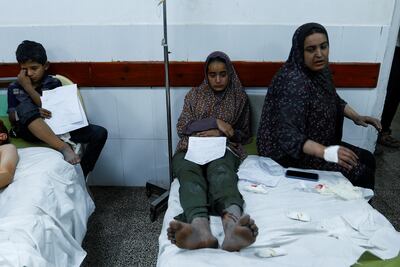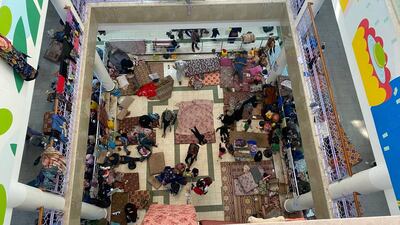Live updates: Follow the latest news on Israel-Gaza
Pregnant women in Gaza are giving birth in “horrific” conditions, doctors and aid groups have warned.
In many instances they are admitted to hospital when fully dilated, with some forced to deliver their babies in cars.
“The situation for pregnant women in Gaza is horrific and devastating,” said Ammal Awadallah, executive director of the Palestinian Family Planning and Protection Association.
"All pregnant women are now at severe risk of delivering in unsafe conditions, being put in situations where they are giving birth in cars and in shelters."
Palestinian Family Planning and Protection Association
The group estimates there to be at least 30,000 pregnant women in Gaza.
“If fortunate enough to reach a health centre or hospital, they are admitted only when fully dilated and are dismissed within a few hours after giving birth due to overcrowded facilities and extremely limited resources," Ms Awadallah told The National.
“A number of C-sections are being performed without basic medical supplies or anaesthesia and without any postnatal care.”
A Gaza mother experienced this first hand when she was asked to leave the hospital within hours of giving birth last week.
“She had to go through the delivery without pain killers, she has stitches, she is bleeding and is in so much pain,” said Maha Mohammed, a friend of the family.
“She had just delivered, stayed in hospital for one hour and they sent her home because there are no beds for such cases.

“Beds are only for severe, dangerous cases – every bed counts.”
Ms Mohammed said there was no choice but to accept that hospitals are under too much pressure to help her friend, who needs postpartum care.
“Nothing can be done, only if you are suffering from something serious then you can go to hospital,” Ms Mohammed said.
“We are in a bad situation but there are worse things.
“She is in a lot of pain but she is alive.”
Thousands face complications
Aid groups describe a worsening situation in Gaza after more than a month of intense Israeli strikes that have killed more than 10,800 people, almost half of them children. Israel says it is targeting Hamas, the group that rules Gaza and whose fighters killed more than 1,400 people people in southern Israel on October 7.
The bombings have damaged health facilities, with only a few still functioning after an Israeli blockade left them without fuel for generators and running out medical supplies.
“All pregnant women in Gaza lack access to safe and hygiene services, with approximately 7,500 expecting to face some sort of complication,” Ms Awadallah said.
“Priority is often not for women going into labour and will depend on if a bed is available,” she said.

Ms Awadallah said the fate of an estimated 180 women expected to go into labour every day and the lives of their babies depended on humanitarian supplies reaching Gaza.
With water and other basic essentials in short supply, pregnant women are vulnerable to disease in the unsanitary conditions of crowded shelters, as well as malnutrition and anaemia due to the lack of adequate food.
“What is happening in Palestine is inhumane and unacceptable,” Ms Awadallah said.
“Water, food, fuel, electricity, safe and dignified shelter, medical supplies, equipment and facilities need to be available for safe delivery.”
Vulnerable to disease
Al Shifa, the largest hospital in the Gaza Strip, is forced to send pregnant women away to smaller clinics because it is already filled beyond capacity with people hurt in Israeli strikes or rescued from collapsed buildings.
Marwan Abusada, senior surgeon at Al Shifa, said that before the war, the hospital had five operating theatres for gynaecology and obstetrics.
When this filled up with injured patients, the department was moved to another medical facility, but the main hospital began taking in pregnant women again after that clinic was hit in Israeli air strikes.
“When pregnant women come in the daytime they need to go home after the delivery.
“If they come at night, they can stay until morning because it’s unsafe to leave until it is daylight,” Dr Abusada said.
“Al Shifa emergency is full of severely injured people with head, abdomen and limb wounds.
“It is a horrible situation – every hospital in Gaza is dealing with the same situation.”
The hospital's 200-bed section for surgery patients now has 900 packed into the building, with some placed in operating theatres because of the lack of space.
“We cannot offer pain killers or even proper antibiotics to all patients,” Dr Abusada said.
“Anaesthesia is sometimes not available and sometimes we discharge patients without antibiotics.”
The focus is on injured patients, some of whom lie on the floor or share hospital beds.
Diseases spread because spaces are overrun with thousands seeking refuge.
“This is a grave, dangerous situation, to have displaced people among patients," Dr Abusada said.
“We are afraid about upper respiratory tract infections, skin diseases among displaced people, diarrhoeal diseases that can spread.
“I appeal to international organisations to evacuate patients who need care and to Israel to stop this aggression.”

